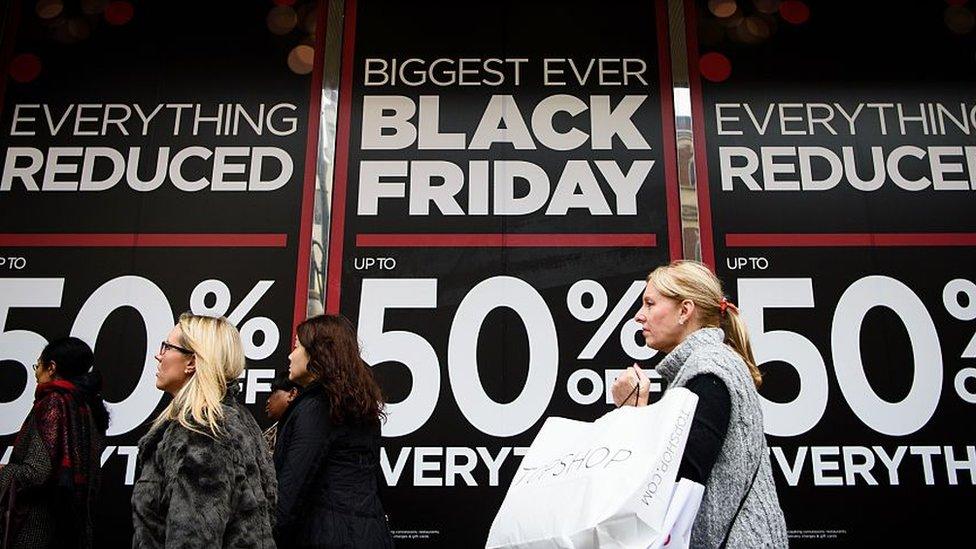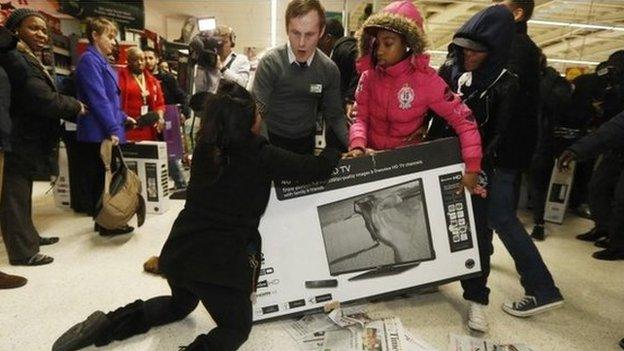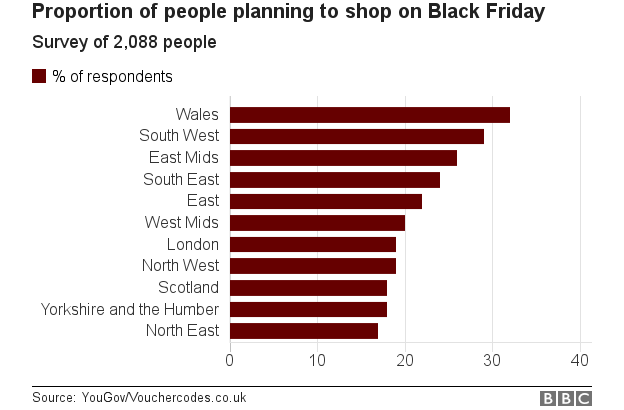Black Friday: Is it still a big deal for High Streets?
- Published

Black Friday sees retailers offer big discounts
Black Friday is the US import that sees bargain-hunting shoppers spend billions in the hope of a cut-price Christmas, but has it had its day?
The fourth Friday in November has been a fixture in the US for decades. It is the day after Thanksgiving, when shops try to tempt people with big discounts.
In the UK, it is a pre-Christmas flash sale on shops and the web, followed by Cyber Monday, which is just online.
But will shoppers take to the sales with as much enthusiasm as before?
There were concerns by some retailers, most notably Asda, who dropped Black Friday altogether in 2015, that shoppers were being held "hostage" to sales.
And the fights that broke out in 2014, as customers competed for the best bargains, did not exactly endear it to managers either.

Fights broke out on Black Friday in 2014 as customers competed over items
Where is Black Friday most popular?
Norwich, for online shopping. That is according to Royal Mail, which analysed the packages it processed and delivered after Black Friday in 2015.
The top 10 online shopping hotspots for Black Friday were:
Norwich
Dorchester
Exeter
Bournemouth
Swansea
Aberdeen
Torquay
Inverness
Taunton
Lancaster
Is it just the UK copying America?
No. Canada and Mexico, as neighbours to the US, have it too. And Black Friday has been exported around the world to different countries with their own interpretations.
In Romania, it took place on 18 November, a week before the US. It is driven by online retailer eMAG, which set the date.
India, too, is expected to see the same discounts on its own versions of online retailers such as Amazon.
In France, it was a break with the tradition of summer and new year sales to adopt Black Friday - even if some experts claimed it was "artificial".
Will Black Friday be as big this year?

Probably. It is expected that about one in five people will shop on Black Friday, with Wales and the South West of England the biggest participants.
Shoppers are expected to spend almost £2bn, 19% more than on the same day in 2015, at least according to one expert report.
And although 2015 saw people spend more than they did in 2014, the number of sales through physical stores is expected to fall, according to the Centre for Retail Research and VoucherCodes.co.uk.
It was online shopping that benefited from an 11% rise in sales over Christmas 2015. And it is likely to do so again.
However, while one set of research suggests people will spend more, another finds shoppers might take things more steadily.
According to a survey by Vouchercodes.co.uk and the Centre for Retail Research suggests a "modest" increase in spending. Their sample was of 1,000 shoppers.
Completely separate research by Retail Week and Retail Economics, external found 21% of surveyed consumers would try to get a bargain on Black Friday, down from 25% last year.
And 74% of the people surveyed said they expected to spend less than in 2015.
Of course, that is also just a sample of 2,000 people.
Another thing to consider is how retailers are making their own changes. Amazon, for example, launched its discounts on 14 November, spreading the event out.
What will be the effect on shops?
Black Friday and Cyber Monday boost sales on those days. However, shoppers only have so much money to spend. That means they spend less over the rest of the run-up to Christmas.
The Centre for Retail Research said while the day itself got people spending, trade fell back over the next couple of weeks.
"In 2015, shoppers had a lot more money to spend and confidence was higher than in previous years," a spokesman said. "Black Friday was better organised and became a week of discounts with few of the delivery and IT problems experienced the year before."
Will everyone have finished their Christmas shopping early?
A fifth of shoppers will do their shopping in the five days before Christmas, research by Tableau Software, external suggests.
Perhaps that is why the last weekend before Christmas has something now known as Panic Saturday.
And this year, Christmas Eve is on a Saturday as well. The tills will jingle all the way.